Pānui August 2021 - Māori hearing postponement, planning update and summary of Tulou - Our Pacific Voices hearing
Tēnā tātou katoa. He mihi haumaru ki a tātou i tēnei wā uaua. Me noho tātou ki te kāinga, ki te whawhai i te Mate Korona. Mauri ora!
Greetings to us all. We wish for everyone to stay safe at this challenging time. Let’s stay home, to save lives and fight the virus. Mauri ora!
COVID-19 related postponement of Māori investigation hearing
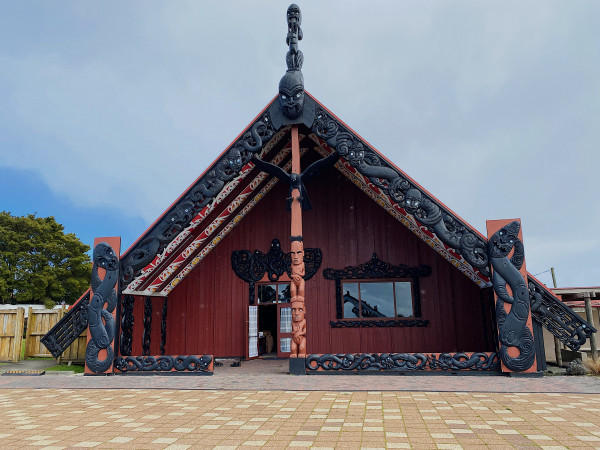
Picture of Whare Tupuna Tumutumuwhenua, Ōrākei Marae, Auckland
In light of the COVID-19 community outbreak and national alert level changes the Commissioners have agreed with advice from the Inquiry to postpone the upcoming Māori investigation public hearing. The hearing was due to take place at the Ngāti Whātua Ōrākei Marae, in Auckland, from 6 to 17 September 2021.
Everyone’s health and safety is of paramount importance to us. The uncertainty around the Delta variant has meant postponing the hearing is the best option to keep all survivors, witnesses, staff and the public safe. Planning for new hearing dates is underway and we will let you know when there is new information to share.
Māori survivors of abuse in care are encouraged to continue coming forward and engage with the Inquiry. To contact the Māori Investigation team please email wiremu.rikihana@abuseincare.org.nz.
Thank you for your patience, especially as COVID-19 continues to challenge us. In the meantime, please prioritise your wellbeing, and keep yourself and your whānau safe.
Nga mihi,
Helen Potiki
Executive Director (Acting)
----------------------------------------------------------------------------------------------------------
Planning update
The purpose of our work at the Abuse in Care Royal Commission has always been certain. Survivors and the power of their voices — individually and collectively — are at the heart of what we do. This purpose will always remain, as we continue to unearth the country’s dark past regarding historical abuse and neglect in State and faith-based institutions.
We’re providing this update as we start finalising the re-planning of our Inquiry, around the recent Terms of Reference changes and Budget 2021 allocation. The re-planning is timely as we pass the halfway mark, to ensure survivors’ experiences remain front and centre. It’s important we adapt as our work evolves.
It is the right time to reassess and adapt our operational functions to identify better and more efficient ways of working. We must talk to and learn from our survivor advisory groups and other survivors. We must continue to ensure our work is underpinned by Te Tiriti o Waitangi.
This planning has helped us to deliver a new way of working and is changing the way we operate, and it will have an impact on some roles at the Inquiry. The proposals are currently out for consultation with staff before any final decisions are made on staffing levels and the Inquiry’s operating model. We will continue to provide updates on our website over the coming weeks as the planning is finalised.
---------------------------------------------------------------------------------------------------------------
Lifting the dark cloud of abuse - summary of the Tulou - Our Pacific Voices hearing
The Pacific Investigation hearing, ‘Tulou – Our Pacific Voices: Tatala e Pulonga’ was held recently at the Fale o Samoa in Mangere, Auckland.
Tatala e pulonga is a Tongan metaphor meaning ‘lifting the dark cloud’. This metaphor is commonly used to demonstrate the lifting of darkness and in this context, a dark history of abuse in care.
Survivors, their family members and expert witnesses shared their experience and expertise with Commissioners. Their evidence demonstrated themes of racism, stripping of their cultural identity, redress, impacts of the dawn raids, intergenerational impacts of abuse and how abuse in care impacted their lives.
Thank you to the survivors and experts who gave their testimony at Tulou – Our Pacific Voices. Thank you to all the survivors who have registered with the Inquiry. Your accounts influenced the themes covered at this hearing and others and will shape our final report.
The witnesses and experts who appeared at the hearing and links to their evidence on our website are listed at the end of this story. Here are some highlights from the hearing:
Opening ceremony
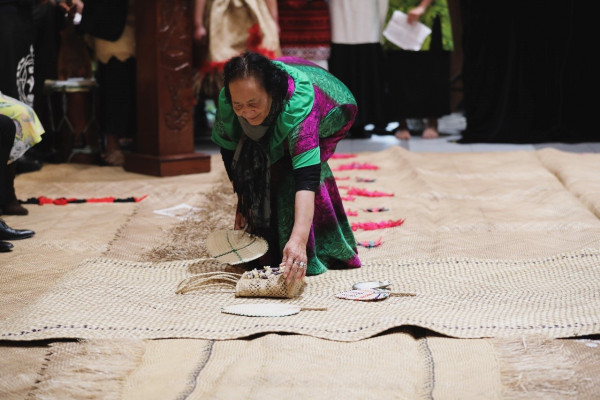
At the opening ceremony, representatives of Pacific Island nations came together to fofola e fala ka e talanoa e kainga, to lay down a traditional mat to create a safe space for survivors to talanoa, to share their experiences and to tell their stories
-
Links between migration and state care
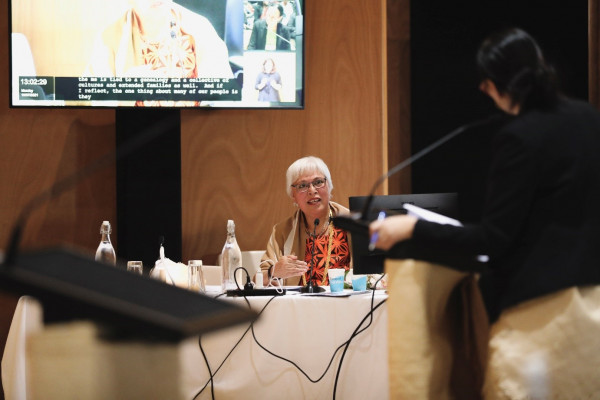
Associate Professor Hon. Luamanuvao Dame Winnie Laban
The first witness to give evidence was Associate Professor Hon. Luamanuvao Dame Winnie Laban, New Zealand’s first female Member of Parliament of Pacific Island descent.
Luamanuvao Dame Winne Laban's evidence provided context on pacific people’s migration to Aotearoa. She said, “The loss of cultural identity, in a rapidly globalising world, is a challenge many people are facing here today in Aotearoa-New Zealand. Many of the children who have ended up in State care are the products of families that have struggled to adapt and fit into New Zealand society and have lost their sense of belonging.”
Other expert witnesses at the hearing included Dr Seini Taufa, Dr Sam Manuela and Folasaitu Dr Julia Ioane. The hearing also dedicated a day to talanoa panels with experts and community advocates, that focused on pathways into care and a pacific lens on redress.
-
Impact of the Dawn Raids
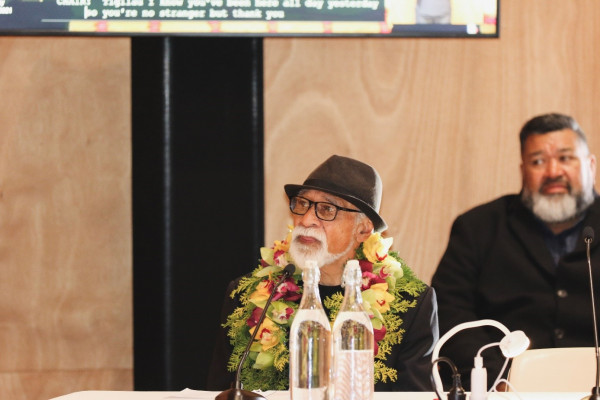
Tigilau Ness
The Dawn Raids and its impact on the Pacific community were another focus of the hearing.
On Day 2, Polynesian Panther Tigilau Ness spoke about racism he experienced at school, including getting expelled for refusing to get a haircut. He said, “I learned first-hand about racism and being treated as inferior even though I had excelled at school.”
“One day the principal called me into his office and told me to get a haircut. I was two months into sixth form. I tried to explain to the principal that in the Niuean culture, the eldest son doesn't cut his hair until he becomes a teenager and a traditional haircutting ceremony — Hifi Ulu — takes place when the family decide it is time. He didn't know anything about it and wasn't concerned. He was only concerned that I get a haircut."
Ness’ evidence also gave context to the increasing tension towards Pacific people before and during the Dawn Raids.
“It was not uncommon for Pacific Islanders to get picked up for no reason by the police and be charged with idle and disorderly offences. Some of our children would be taken. They would spend days, nights or even weeks in cells and then charges simply dropped. This treatment is abuse in care.”
-
Dawn Raids experience kept secret for 50 years
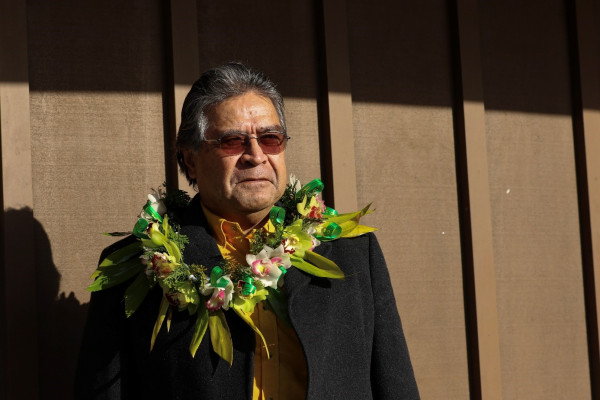
Tesimoni Fuavao
Another survivor Tesimoni Fuavao shared his experience of how his family home was raided after being stopped by police on the street.
Tesimoni Fuavao was 20 years old when four palagi police officers barged into the family’s Grey Lynn home at 4.30am, entered his parents’ room and handcuffed them, accusing them of overstaying their visa.
He said, “To this day, I still hold feelings of guilt about giving the Police our address, even though I felt I had no choice."
His family carried the trauma of the incident for the rest of their lives, and kept it secret from the rest of their family for more than 50 years. He said, "I felt really ashamed by the raid and about how many people knew because in Tonga, being arrested was very very bad. I carried the shame of what happened and people knowing throughout my life. I also blamed myself for what happened to my parents. My parents also felt this shame. They never wanted to talk about the dawn raid much. "
"I want to share my experiences so that my extended family, our Pacific communities, and the public can understand how the abusive treatment and neglect by the State impacted me and my family over the years."
-
Survivor didn't know he was Samoan growing up
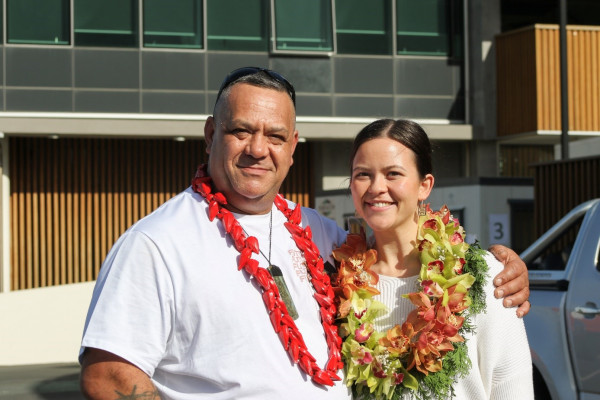
David Crichton with his daughter Brooke
David Crichton grew up believing he was Māori. Only upon receiving his care files at the age of 30 did he discover his Samoan ethnicity and knowledge about his Samoan aiga (family).
He told Commissioners of the significant impact the stripping of his culture had on him and his family. He said, “I am covered in Māori tattoos because I believed that that was who I was. If I had truly known of my Samoan cultural heritage I would likely be covered in Samoan tatau.”
It took David nearly 15 years to accept his Samoan heritage. He said “I suffered all forms of abuse during my time in care, but the stripping of my cultural identity is the one thing that hurts the most and has had the most effect on me and my family.”
-
Survivor kept in seclusion for 6 weeks
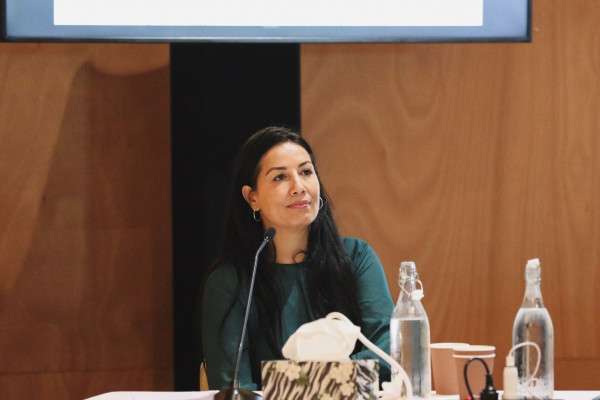
Joanna Oldham
For survivor Joanna Oldham, speaking out has brought healing for the “little monster” created by abuse in state care.
During her evidence, Joanna spoke about her experience of sexual abuse by a Reverend of the Anglican Church, followed by placements in various care settings including Kingslea Girls Home where she was abusively restrained, strip-searched and once kept in seclusion for six weeks.
“It is indescribable the trauma of being locked up in a concrete cell at that age and having no one to talk to, or even look at. I would scream, and cry, and howl in my cell in Secure, and staff would ignore me.”
Joanna’s ethnicity was also frequently recorded incorrectly during her time in care.
"When I was first taken into state care, my ethnicity was listed as half European, half Tongan. Despite Social Welfare getting my ethnicity correct the first time, throughout my records Social Welfare subsequently mistook me as Māori, Samoan, Cook Island Māori, and Niuean."
-
Boys’ home watchman quit after witnessing too much violence
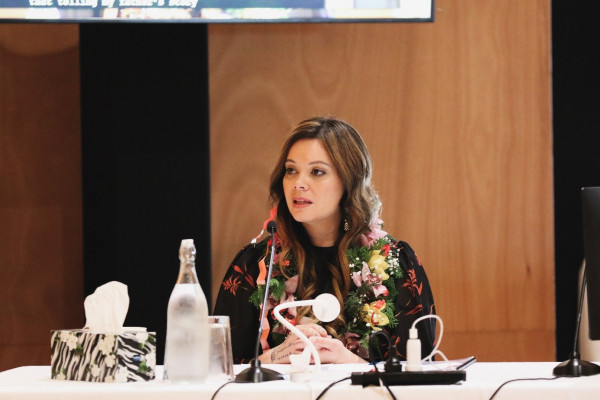
Tupe Solomon-Tanoa’ who read out her father Puloto Arthur Solomon-Tanoa’i’s testimony
Pulotu Arthur Solomon, a former watchman at a state home for boys, said that he saw so much violence he quit after just four weeks on the job.
His daughter, Tupe Solomon-Tanoa’i, read out his testimony on his behalf at the hearing.
In his statement, he said that his colleagues warned him not to tell anyone about what he saw.
“I felt helpless to say or do anything about what I saw because the abuse was coming right from the top.”
-
Closing ceremony
Our closing ceremony featured a traditional performance by a Niuean group, and students from Māngere college. The fine mats laid out at the Opening Ceremony were also rolled up and carried away by survivors and students.
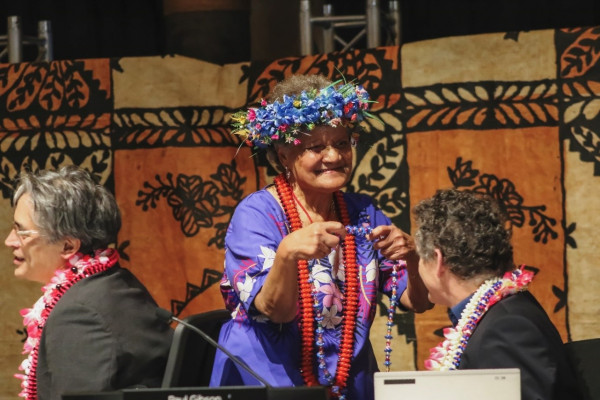
A member of the Niuean group gifting kahoa hihi, a shell necklace, to Commissioner Paul Gibson

A Niuean group who performed at the closing ceremony included survivor, Hake Halo.
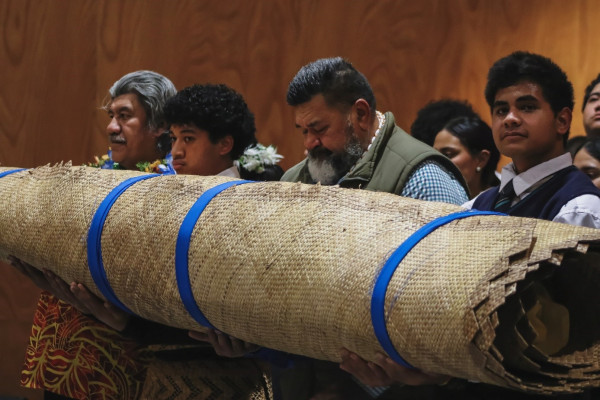
Mats being carried away by survivors and students from Māngere College
Written and video evidence of each witness can be found on the Tulou - Our Pacific Voices hearing page.
----------------------------------------------------------------------------------------------------------------------
Taking part
Information about the different ways you can take part in this Inquiry can be found on the Get involved section of the website.
